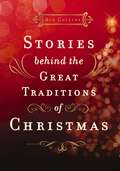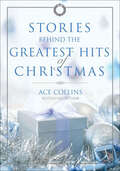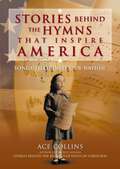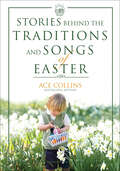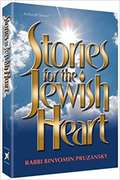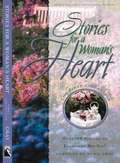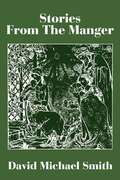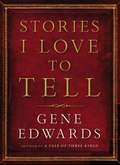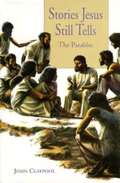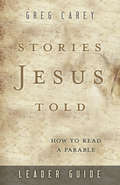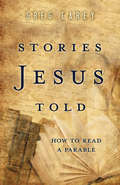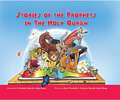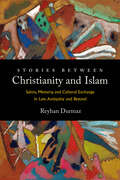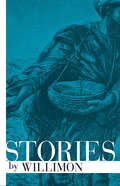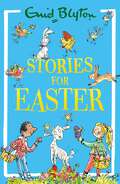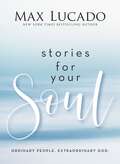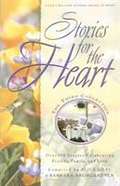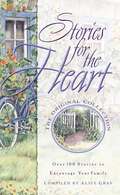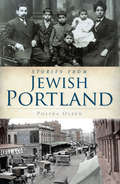- Table View
- List View
Stories Behind the Best-Loved Songs of Christmas
by Ace CollinsBehind the Christmas songs we love to sing lie fascinating stories that will enrich your holiday celebration. Taking you inside the nativity of over thirty favorite songs and carols, Ace Collins introduces you to people you’ve never met, stories you’ve never heard, and meanings you’d never have imagined. The next time you and your family sing "God Rest Ye Merry Gentlemen," you’ll have a new understanding of its message and popular roots. You’ll discover how "Angels from the Realms of Glory," with its sublime lyrics and profound theology, helped usher in a quiet revolution in worship. You’ll learn the strange history of the haunting and powerful "O Holy Night," including the song’s surprising place in the history of modern communications. And you’ll step inside the life of Mark Lowry and find out how he came to pen the words to the contemporary classic "Mary, Did You Know?" Still other songs such as "O Come, O Come, Emmanuel" trace back to mysterious origins--to ninth-century monks, nameless clergy, and unknown commoners of ages past. Joining hands with such modern favorites as "White Christmas" and "The Christmas Song," they are part of the legacy of inspiration, faith, tears, love, and spiritual joy that is Christmas. From the rollicking appeal of "Jingle Bells" to the tranquil beauty of "Silent Night," the great songs of Christmas contain messages of peace, hope, and truth. Each in its own way expresses a facet of God’s heart and celebrates the birth of his greatest gift to the world--Jesus, the most wonderful Christmas Song of all.
Stories Behind the Great Traditions of Christmas
by Ace CollinsWonderfully written descriptions explaining many of our most valued Christmas traditions.
Stories Behind the Great Traditions of Christmas
by Ace CollinsThe cheer of a crackling hearth fire. Colorful cards from friends and loved ones. An evergreen tree festooned with ornaments. The golden traditions of Christmas—gifts, wreaths, stockings, carols, mistletoe, and more—infuse our celebration of the season with meaning and glowing memories. And, in ways you may not realize, they point us to the birth of Christ. Stories Behind the Great Traditions of Christmas reveals the people, places, and events that shaped the best-loved customs of this merriest of holidays. Here are spiritual insights, true-life tales, and captivating legends to intrigue you and your family and bring new luster and depth to your celebration of Jesus’ birth. Discover how • after eighteen centuries of all but ignoring the event, churches began to open the door for believers to commemorate Jesus’ incarnation. • the evergreen tree, once a central theme in the worship practices of pagan cultures, came to represent the everlasting love of God. • the magi’s three gifts—gold, frankincense, and myrrh—are filled with spiritual symbolism. The traditions of Christmas lend beauty, awe, and hope to the holiday, causing people all over the world to anticipate it with joy. The stories in this book will warm your heart as you rediscover the true and eternal significance of Christmas.
Stories Behind the Greatest Hits of Christmas
by Ace CollinsMuch like The Stories Behind The Best-Loved Songs Of Christmas, The Stories Behind The Great Traditions of Christmas and More Stories Behind The Best Loved Songs of Christmas this new Collins Christmas book will fill a void in the book world. With a look at these secular classics, people who love the music of the season will finally have a source that gives the stories behind the creation of these wonderful songs, the way they found their way into the hands of those who made them famous and the reason they climb the charts.The Stories Behind the Greatest Hits of Christmas is really a guide or a map that connects Christmas past with Christmas present. It will be a time machine that connect the past to the present and makes the experience of hearing Christmas classics even more special. Completed with thoughts of those who penned these classics, along with the artists, such as Brenda Lee, who made them famous, this will be a book that is sure to generate fan interest.
Stories Behind the Hymns That Inspire America: Songs That Unite Our Nation
by Ace CollinsFrom the moment the pilgrims landed on the shores of the New World, to the dark days following September 11, songs of faith have inspired, comforted, and rallied our beloved country. Stories Behind the Hymns That Inspire America describes the people, places, and events that have shaped the heart and soul of America. The stories behind these songs will fascinate you and bring new meaning and richness to special spiritual moments in the history of our nation. Discover how: § “Faith of Our Fathers,” sung at Franklin Delano Roosevelt’s funeral, had its roots not with the pilgrims but with a Catholic fighting for the right to worship freely in Anglican England § World events, from the downing of Flight 007 in Russian airspace to Desert Storm and September 11, propelled Lee Greenwood’s “God Bless the U.S.A.” § The author of “Battle Hymn of the Republic” lived the words “His truth is marching on” until the day she died § Combining African rhythms and southern folk melodies, slaves brought Bible truths to life with songs such as “Roll, Jordan, Roll” The songs in this book have energized movements, illuminated dark paths, commemorated historic events, taken the message of freedom and faith across this nation and beyond, healed broken spirits, and righted wrongs. Their stories will make you proud of your heritage as you realize anew that in America, even one voice can make a lasting influence.
Stories Behind the Traditions and Songs of Easter
by Ace CollinsThe treasured traditions of Easter—little bunnies, parades, new Easter outfits, sunrise services, passion plays, and more—infuse our celebration of the season with meaning and glowing memories. And in ways you may not realize, they point us to the resurrection of Christ and our hope of life beyond the grave. Stories Behind the Traditions and Songs of Easter reveals the events and backgrounds that shaped the best-loved customs and songs of Easter, introducing you to stories you’ve never heard and a deeper appreciation for the holiday’s familiar hallmarks.
Stories For a Woman's Heart: Over One Hundred Treasures to Touch Your Soul (Stories For the Heart #1)
by Alice GrayBack Cover: "Find a quiet corner and snuggle up with this enchanting collection of stories that celebrates the wondrous ways of women. These are timeless treasures selected to inspire your thoughts and stir your soul. Revel in laughter and friendship. Cherish special moments that reach across generations. And be encouraged by tender stories of compassion that are sure to tug at your heart." In this collection, Alice Gray has compiled over 100 stories that provide inspiration and encouragement. Some of the stories have characters with disabilities while other stories do not. Many of the contributing writers to this collection are Christian and provide a Christian perspective on life. The stories cover a variety of topics such as mothers, relationships, faith, and virtue.
Stories From the Manger
by David SmithExperience the magic. mystery and magnificence of the greatest holiday of the year, (Christmas! No matter the season. these seven colorful short stories, three true tales and four fictional, will surely touch the spirit and tug at heartstrings for both child and adult alike. Visit with an old homeless and hopeless man in New York City on Christmas Eve; can a miracle restore his will to live? Share a poignant and tender evening around the Christmas tree with a dying father and his intriguing, uninvited guest. Take a ride with a very special donkey, one present on the very first Christmas inside a simple, barren stable near Bethlehem. And live the heartache and temptation of a struggling alcoholic who battles his liquid demons on the holiest of nights. Each story will warm your being, and bring back precious memories of your own Christmases past. Stories From The Manger captures the festive flavor, the Joyous atmosphere, and the sheer bliss and good will of the season. You’ll yearn for snow and sleigh bells after spending time with Stories From The Manger.
Stories I Love to Tell
by Gene EdwardsAmerica’s beloved storyteller will guide and thrill your imagination with these classic tales. Join Gene Edwards as he recounts his favorite stories from more than 50 years of travel and ministry.Considered the “Paul Harvey” of Christian writers, Gene Edwards is one of America’s most beloved authors. Stories I Love to Tell, his new book, is a compilation of tales that continue to move audiences. From stories about a chance meeting with Helen Keller at the Garden Tomb in the Holy Land to an astounding Jonah experience inside a whale to stories about a child growing up in a one-room shack, Gene knows how to spin an old-fashioned yarn.During the last four decades, Gene has amassed an enthusiastic, dedicated readership. Stories I Love to Tell will delight and entertain devoted fans as he relays story after astonishing story. You will want to grab a hot drink and huddle around the fireplace as America’s seasoned storyteller transports your imagination to another time and place.
Stories Jesus Still Tells: The Parables
by John R. ClaypoolAesop told fables, Solomon told proverbs, and when Jesus needed to communicate difficult ideas in a calm, persuasive way, He told parables. These were simple stories, whose endings listeners could sometimes anticipate, but whose point they could always grasp. And there was always a surprise in the parables Jesus told. As the parable began, the listeners thought that the story was about someone else, but by the parable's end they knew it was pointed at them. Among the stories Jesus told were the ones about the talents; the treasure, the pearl, and the dragnet; the vineyard owner and his workers; the petulant children; the rich fool; and the great banquet. In this book, John Claypool retells in his own style the familiar stories Jesus once told, and in the retelling Jesus's sweet, clear voice can still be heard. John Claypool invites the reader to open up the deep places in his or her being so that "the Light that enlightens up every person" can illuminate him or her as well.
Stories Jesus Told Leader Guide: How to Read a Parable (Stories Jesus Told)
by Greg CareyThe parables of Jesus—like the Good Samaritan, the Prodigal Son, and the Laborers in the Vineyard—make up the most distinctive element of his teaching and are essential to our common memory of Jesus. However, almost all of them open themselves to multiple interpretations, leaving interpreters to scratch their heads and argue with one another for centuries.In this book, Greg Carey explores six of Jesus’ stories to understand how to read them, interpret them, and understand what they mean for our own lives today.The Leader Guide contains everything needed to guide a group through the six-week study including session plans, activities, and discussion questions, as well as multiple format options.
Stories Jesus Told: How to Read a Parable (Stories Jesus Told)
by Greg CareyWe love stories. That’s why we go to movies, read books, and listen to friends recount an experience. That’s also why teachers use the technique of storytelling to make a difficult concept easier for us to process. Jesus told stories, or parables, for that very reason—and to help us understand how God wants us to live life. Sometimes, however, stories like the Good Samaritan and the Prodigal Son can be interpreted in more than one way. Even Bible scholars are divided on their meanings. In Stories Jesus Told, you’ll explore six of Jesus’ parables to learn how to read, interpret, and live them in your daily life. A DVD and Leader Guide are elements you can add to make a lively, six-week group study.
Stories Of The Prophet In The Holy Quran
by Shahada Sharelle HaqqThis inspiring collection of illustrated stories offers an Islamic take on the lives and missions of familiar prophets. Through these Islamic renditions, children are made keenly aware of the importance of certain virtues - steadfastness, patience, and honesty - exhibited by religious role models in the Qur&’an, including Abraham, Moses, Noah, and Jesus, and the prophets' willingness to endure hardship as a means to an honest life.
Stories between Christianity and Islam: Saints, Memory, and Cultural Exchange in Late Antiquity and Beyond
by Reyhan DurmazStories between Christianity and Islam offers an original and nuanced understanding of Christian–Muslim relations that shifts focus from discussions of superiority, conflict, and appropriation to the living world of connectivity and creativity. Here, the late antique and medieval Near East is viewed as a world of stories shared by Christians and Muslims. Public storytelling was a key feature for these late antique Christian and early Islamic communities, where stories of saints were used to interpret the past, comment on the present, and envision the future. In this book, Reyhan Durmaz uses these stories to demonstrate and analyze the mutually constitutive relationship between these two religions in the Middle Ages. With an in-depth study of storytelling in Late Antiquity and the mechanisms of hagiographic transmission between Christianity and Islam in the Middle Ages, Durmaz develops a nuanced understanding of saints’ stories as a tool for building identity, memory, and authority across confessional boundaries.
Stories by Willimon
by William H. WillimonWill Willimon is known and read throughout the world for his riveting, edgy, witty, and provocative stories or parables. His most beloved, memorable, and impactful stories are presented in this collection. The Stories of Will Willimon will expose readers to joy, agony, thankfulness, greed, trust, fear, healing, suffering, laughter, weeping, yearning, irony, hatred, and love. Readers may see themselves or their friends at times in these stories. Fellow storytellers are likely to retell these stories to friends, family, colleagues, and churches. Preachers will find illustrative materials to support their sermons and all readers will be inspired by the insights into the Christian faith provided.
Stories for Easter
by Enid BlytonA collection of short Easter stories perfect for children from the world's best-loved storyteller!Go on Easter adventures to imagine the biggest chocolate egg ever, discover a lamb who took a ride in a pram and help a rabbit on a very windy day. All these and more in this springtime collection of short stories from Enid Blyton. Perfect for children aged five and up!These traditional tales are ideal for younger children being read to and for newly confident readers to read alone. Each story stands alone and is the perfect length for reading at bedtime or in the classroom.Enid Blyton remains one of Britain's favourite children's authors and her bumper short story collections are perfect for introducing her to the latest generation of readers.***Enid Blyton® and Enid Blyton's signature are registered trade marks of Hodder & Stoughton Limited. No trade mark or copyrighted material may be reproduced without the express written permission of the trade mark and copyright owner.
Stories for Easter
by Enid BlytonA collection of short Easter stories perfect for children from the world's best-loved storyteller!Go on Easter adventures to imagine the biggest chocolate egg ever, discover a lamb who took a ride in a pram and help a rabbit on a very windy day. All these and more in this springtime collection of short stories from Enid Blyton. Perfect for children aged five and up!These traditional tales are ideal for younger children being read to and for newly confident readers to read alone. Each story stands alone and is the perfect length for reading at bedtime or in the classroom.Enid Blyton remains one of Britain's favourite children's authors and her bumper short story collections are perfect for introducing her to the latest generation of readers.***Enid Blyton® and Enid Blyton's signature are registered trade marks of Hodder & Stoughton Limited. No trade mark or copyrighted material may be reproduced without the express written permission of the trade mark and copyright owner.
Stories for Your Soul: Ordinary People. Extraordinary God.
by Max LucadoLife can be hard: grief, loss, busyness, financial hardships, abuse, broken relationships, and illness are just some of the difficulties we all face on a regular basis. It's easy to lose faith in your neighbor and feel like you&’re alone--but Max Lucado assures us that hope is here. Stories for Your Soul: Ordinary People. Extraordinary God. by pastor and New York Times bestselling author Max Lucado will reestablish your faith in people and the Lord by sharing the good in the world.Compiled from Max's catalog of treasured stories, this collection of ordinary miracles sheds light on the ways that everyday people are doing God's work while also sharing their gifts with others.Throughout Stories for Your Soul, you'll read about:Nicholas Winton, a twenty-nine-year-old stockbroker, who rescued 669 children during World War IIFavio Chavez and Don Cola Gomez--two men recycling the world&’s trash into musical instrumentsJimmy Wayne and how complete strangers gave him a home and became his familyAnd many more amazing storiesAt the end of each inspiring story, you'll find two reflection questions to help you dig deep into your life and identify ways you can use your own gifts to change the world while deepening your faith in God.
Stories for the Heart the Third Collection: Over 100 Stories Celabrating Friends, Family, and Love (Stories for the Heart)
by Alice Gray Barbara BaumgardnerIn this collection, Alice Gray and Barbara Baumgardner compiled over 100 selections that provide understanding and compassion. These entries comprise stories, poetry, vignettes, and sayings. Some of the entries have characters with disabilities, while other selections do not. Many of the contributing writers to this collection are Christian and provide a Christian perspective on life. The compilers placed the selections under these categories: Encouragement, Love, Inspiration, Family, Memories, Life, and Faith. The final section, Because We Care, is an evangelistic one designed to lead readers to God.
Stories for the Heart: Over 100 Stories to Encourage Your Soul (Stories for the Heart #1)
by Alice GrayIn this original collection, Alice Gray, author and compiler, assembled over 100 selections that provide inspiration and encouragement. These selections comprise stories, poetry, and sayings. Some of the entries have characters with disabilities. Many of the contributing writers to this collection are Christian and provide a Christian perspective on life. The selections cover a variety of topics such as compassion, relationships, faith, and virtue. The last section is evangelistic and is designed to help readers find God.
Stories from Africa
by Kerry LoveringSix exciting stories. In Jabo's Mystery Box, the young Jabo learned why Adam and Eve couldn't resist the devil. In The Girl Who Sang in The Goathouse, we meet a little girl with great courage. In Rescue by Airplane, Rich helps a sick boy and thanks God for His miracles. In Lion in the Path! two missionaries almost get eaten by two lions. In "Thank You, Debbie!" a little girl makes a big difference. In Dija And The House of Medicine, a ten-year-old walks far to find a cure for leprosy.
Stories from Jewish Portland (American Heritage)
by Polina OlsenThese are the stories of Jewish Portland, whose roots stretch back to the Gold Rush, whose heart is 'the old neighborhood' of South Portland and the memories of its residents, whose identity is alive and well in synagogues and community institutions. Portland author Polina Olsen recounts the history of this richly layered community through a collection of letters, interviews, and stories drawn from her series "Looking Back," published in The Jewish Review. In this expanded collection, explore the lives of early settlers brought by opportunity and New York's Industrial Removal Office, walk the streets of the old neighborhood, alive with basketball games and junk peddlers, and learn the proud history of institutions like the Jewish Federation of Greater Portland, which continue the cultural traditions of Jewish Portland.
Stories from Jonestown
by Leigh FondakowskiThe saga of Jonestown didn&’t end on the day in November 1978 when more than nine hundred Americans died in a mass murder-suicide in the Guyanese jungle. While only a handful of people present at the agricultural project survived that day in Jonestown, more than eighty members of Peoples Temple, led by Jim Jones, were elsewhere in Guyana on that day, and thousands more members of the movement still lived in California. Emmy-nominated writer Leigh Fondakowski, who is best known for her work on the play and HBO film The Laramie Project, spent three years traveling the United States to interview these survivors, many of whom have never talked publicly about the tragedy. Using more than two hundred hours of interview material, Fondakowski creates intimate portraits of these survivors as they tell their unforgettable stories.Collectively this is a record of ordinary people, stigmatized as cultists, who after the Jonestown massacre were left to deal with their grief, reassemble their lives, and try to make sense of how a movement born in a gospel of racial and social justice could have gone so horrifically wrong—taking with it the lives of their sons and daughters, husbands and wives, fathers and mothers, and brothers and sisters. As these survivors look back, we learn what led them to join the Peoples Temple movement, what life in the church was like, and how the trauma of Jonestown&’s end still affects their lives decades later.What emerges are portrayals both haunting and hopeful—of unimaginable sadness, guilt, and shame but also resilience and redemption. Weaving her own artistic journey of discovery throughout the book in a compelling historical context, Fondakowski delivers, with both empathy and clarity, one of the most gripping, moving, and humanizing accounts of Jonestown ever written.
Stories from Our Living Past
by Francine ProseTwenty-eight Jewish tales with morals, including "Daniel in the Lion's Den," "The King's Garden," and "The Goat that Made the Stars Sing."


